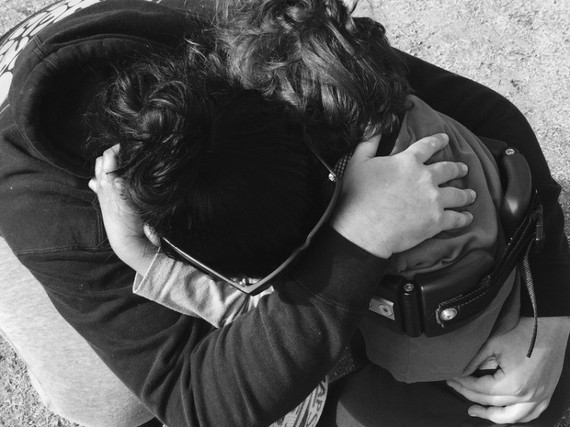My name is DiDi Delgado. It used to be something else, but that's another story. We'd have to sit down and have a cup of tea together before we got into disscussing all of that. I was born to Carmen Patricía, who was born to Maria Theresa who migrated to the United States from Mexico. Now that I've explained my maternal lineage let me make it clear: I'm black. Yup. I said it. Black. Regular Black. Maybe it'll read differently than how I say it in person. Perhaps me telling you all this will ensure you won't ask follow up questions like "What
are you?" Me: Black. "Yeah, but what are you mixed with?" Me: Black. I figure even if my father
was a Spanish speaking person, I'd still feel convicted to answer that I'm definitely part of the African Diaspora. Sure I was born here in America, but
mi herencia (my heritage) began before the Civil Rights movement, before the Mexican Revolution, before Christopher Columbus told the Spaniards he had discovered America and certainly well before slave ships steered towards the African coast.
It's difficult for me to admit that I didn't always feel, think or operate out of prideful blackness. As a child where I was rewarded for being the pretty, "good-haired" light-skinned, "she's
so well spoken" girl (You know; all the internal subliminal images we as people of color push on to our kids and each other, because we've been taught that in order to be considered civilized, intelligent and remarkable, we've got to keep our heads down, stay out of the way and emulate our white counterparts, while somehow working twice as hard just to be accepted in today's society.) I never thought about rejecting this faux level of supremacy because simply put: at that age, how was I to know it was wrong? It felt good to receive compliments. It wasn't until I arrived at high school and learned that I was also "mixed" with Cape Verdean blood, that I began to see situations present themselves where this type of thinking might be harmful or hurtful. My school's population was predominantly Cape Verdean students. Cape Verde is an island country located alongside Western Africa that was colonized by the Portuguese. They speak Cape Verdean (CV) Creole or
Kriolu which is an Afro-Portuguese language. A lot of the girls had separated themselves into cliques. Black vs. Spanish speaking girls vs. CV girls. The rivalry between the three groups, about which one of our cultures was the best, had started getting out of hand. Once, our Italian gym teacher cancelled class after a fist fight broke out between two girls over who was prettier and spoke better English. Ms. Peretti screamed out to us "You're all BLACK!" We sat cross-legged on the gym floor not even believing her.
When I was 19 I shared with my counselor, a black woman with dreads, some of my experiences with receiving preferential treatment in predominately white work spaces in comparison to my darker-skinned counterparts. Like the time I was at a job interview and another applicant was telling me about finishing up her bachelor's, and I was telling her I was just enrolling in community college. I got the job and she didn't. My counselor asked me if I felt that I received the job because of how I look. I said "yes" because that's what I'd been taught and it was pretty much the reality at the time. I felt as if she took my comment offensively, as she asked for me to be transferred to another counselor. In hindsight, it would have made for a great conversation for her to treat my comments as a teachable moment; that getting a seat at the proverbial table temporarily doesn't mean that my hosts think I deserved to be served the same dinner they're eating.
I wouldn't fully understand what these experiences meant until four years later while working at a predominantly Portuguese speaking accounting firm, I announced that I had been learning
Kriolu, and improving my Spanish. Everyone looked around and shifted uncomfortably. The owner's wife pulled me aside and "informed" me that I should take up Portuguese if I wanted to learn my "history" because speaking
Kriolu would be considered speaking "slang". I read this as my history is being replaced with their history. That it would be more civilized, more intelligent, more... assimilated to become more like them and less like me. John Henrik Clarke said "To control a people you must first control what they think about themselves and how they regard their history and culture. And when your conqueror makes you ashamed of your culture and your history, he needs no prison walls and no chains to hold you."
It's been 15 years since that incident with Ms. Peretti in high school and 10 years since I acknowledged that color-ism plays a huge part in the internal racism both in me and within our communities of color. Everyday, I'm growing and I look at things a little differently now. I don't share anymore articles or memes depicting "#TeamLightSkinned", "#TeamDarkSkinned", "BlackGirlsDoItBetter" or "#LatinasAreTheBest. It's all separatist and designed to keep us fighting each other. I see this with not only with blacks in the United States, but with Dominicans, Colombians, Puerto Ricans, Cubans and
yes even Mexicans.
I can't speak for everyone else, but I believe we have to change the dirty linen on the equality table. It'll probably offend some people, but I'm putting the focus more on loving my blackness because I figured out what everyone has been saying all along is true. We're all BLACK. Some of us just don't know it yet. Although I often feel conflicted about calling myself anything that someone decided to call me based on my skin tone, my heritage or my background; I hope that I've answered your questions when I respond with: Yo soy AFROLATINA.
-- This feed and its contents are the property of The Huffington Post, and use is subject to our terms. It may be used for personal consumption, but may not be distributed on a website.
![]()
![]()
![]()
![]()
![]()
![]()
![]()
![]()








